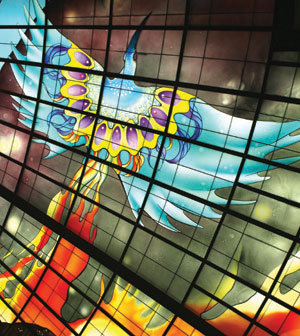Kaohsiung MRT Orange Line to Launch Officially / 橘線通車 高雄啟動
Kaohsiung MRT Orange Line to Launch Officially
◎Text by Hsin-Yi Peng
◎Photos by Chung-Hui Pao
In March 2008, Kaohsiung MRT launched the Red Line and officially began operation, bringing citizens of Kaohsiung City a first-hand experience of the convenience and comfort of traveling on the MRT. Kaohsiung made a big step towards its goal to reinvent itself as a modern international metropolis.
.jpg) The coverage of the Kaohsiung MRT in the preliminary stage includes the south/north-bound Red Line, and will soon be joined by the west/east-bound Orange Line. The Orange Line starts from Hamasen station in the west and ends at Daliao station in the east, connecting major stations such as Kaohsiung and Fongshan. The Orange Line is scheduled to begin operation in September 2008. Residents in Kaohsiung City as well as greater Kaohsiung area, including Hamasen, Ciaotou, Fongshan, and Siaogang will all benefit from this convenient transportation network.
The coverage of the Kaohsiung MRT in the preliminary stage includes the south/north-bound Red Line, and will soon be joined by the west/east-bound Orange Line. The Orange Line starts from Hamasen station in the west and ends at Daliao station in the east, connecting major stations such as Kaohsiung and Fongshan. The Orange Line is scheduled to begin operation in September 2008. Residents in Kaohsiung City as well as greater Kaohsiung area, including Hamasen, Ciaotou, Fongshan, and Siaogang will all benefit from this convenient transportation network.
The MRT brings more than just the practicality of convenient transportation to people in Kaohsiung. The Orange Line, like the Red Line, has a few theme stations; among its fourteen stops, there are two featuring masterfully designed architecture and art pieces to greet commuters everyday and bring a cheerful start to their day at work or school. Out of all of the theme stations, Formosa Station has caught much of the public interest.
Formosa Station (O5/R10) is the junction of the Red Line and Orange Line and is the center of the Kaohsiung MRT network. Thoughtful attention to details can be seen at every corner of this station. The main entrances were designed by Japanese architect, Shin Takamatsu, with the theme "praying" . It is a remembrance of the Formosa Incident, a symbol of peace and prosperity for the future of Kaohsiung, a reminder to inspire future generations to work together and realize their dreams.
The entrances are not the only eye-catching pieces at the Formosa Station. The station body hosts the largest glass art work in the world, "The Dome of Light", designed by Italian artist, Maestro Narcissus Quagliata, in cooperation with renowned European glass workshop, the Derix Glasstudios. The Dome of Light is 30 meters in diameter, and the entire display covers 660 square meters. It took four and a half years to create this masterpiece. The dome was assembled using 4,500 glass panels to present four themes; it tells the stories of the circle of life, with a reflection of Taiwanese people's efforts in achieving freedom and democracy. It pays homage to the Formosa Incident, a historical event that documented Taiwan's pursuit of freedom, with a message of rebirth and tolerance for its audience to look up to.
The other theme station is O9 Martial Arts Stadium Station. This station is in close proximity to several sports facilities and the design of the station took up the dynamic of sports and energy to carry the theme of "Ocean, Sports, Energy" . This district is designed to host future international sports events in Kaohsiung, and in consideration of the crowds during those events, the station adopted an oval-shaped atrium at its entrance with an open-space design. The entrance leads to the Ocean Sports Cultural Sculpture Plaza, also designed with the capacity to hold a large crowd. It serves not only as a theme entrance to the MRT, but also as a future outdoor performance space, corresponding to the energetic image of the Sports Park district.
The Orange Line will be ready for passengers very soon. When you take the Orange Line to visit the old streets in Yancheng, or to see the sunset in Sizihwan Bay, don't forget to make a stop at the two beautiful theme stations. Not only will you enjoy the local scenery on a relaxing ride, you will also be impressed by the artful display of the theme stations.
橘線通車 高雄啟動
◎文/王御風
◎攝影/鮑忠暉
 今年三月,當高雄捷運紅線通車,高雄市民首次感受到了捷運帶來的便利與舒適,也讓高雄市向現代化國際大都會,更向前邁進了一大步。
今年三月,當高雄捷運紅線通車,高雄市民首次感受到了捷運帶來的便利與舒適,也讓高雄市向現代化國際大都會,更向前邁進了一大步。
高雄捷運的路網,除了貫通南北高雄的紅線外,還有一條西起哈瑪星、東到大寮,連結高雄市與鳳山的橘線。也因此,九月橘線通車後,高雄縣市的民眾,不論是住在市中心或是哈瑪星、橋頭、鳳山、小港都可享受便捷的交通網。
除了交通的便利外,橘線與紅線一樣,在全線14個車站中,設有2個造型特殊的站體,讓每天搭車的民眾,也能在大師的藝術薰陶下,帶著愉快的心情上班、上學。其中最讓大家期待的,就是美麗島站。
O5/R10美麗島站是捷運紅線與橘線的交叉點,可說是高雄捷運的交通重心。在站體上更是精心規劃,出入口請日本建築師高松伸以祈禱為主題所設計,呼應曾發生的美麗島事件,也為高雄市的未來及和平祈福,更盼世世代代子孫能凝聚於此,攜手共創築夢踏實的未來。
除了出入口外,內部還有全世界最大的玻璃藝術「光之穹頂」,這是由義大利藝術家水仙大師(Maestro Narcissus Quagliata)耗時四年半所創作,其直徑達三十公尺,面積六百六十平方公尺,由水仙大師與享譽歐洲的德國Derix工作坊合作完成,穹頂依創作主題分為四大區塊,共計用了4500片玻璃窗面,勾勒出生命輪迴與台灣人的自由民主歷程以及結合美麗島事件追求民主自由的過程,表達重生與包容的內涵。
另一個特殊站體是O9技擊館站,因本站有許多運動設施,所以在設計上以運動與活力為主軸,架構「海洋、運動、活力、捷運」之意象,該站為高雄市舉辦大型國際體育賽事之主要場地,在比賽時將會有大量人潮,因此其出入口特別採用橢圓開放式的天井設計,同時為能容納許多人進出,特別設計為海洋運動文化雕塑廣場。這個出入口不僅將成捷運的特色,還能做為表演的場地,營造整個體育園區的意象。
捷運橘線通車後,當您搭乘捷運逛鹽埕老街、到西子灣看落日時,也別忘了欣賞兩座美麗的車站,在遊覽當地的人文景色之餘,相信您會發出讚嘆:「原來車站可以如此藝術!」